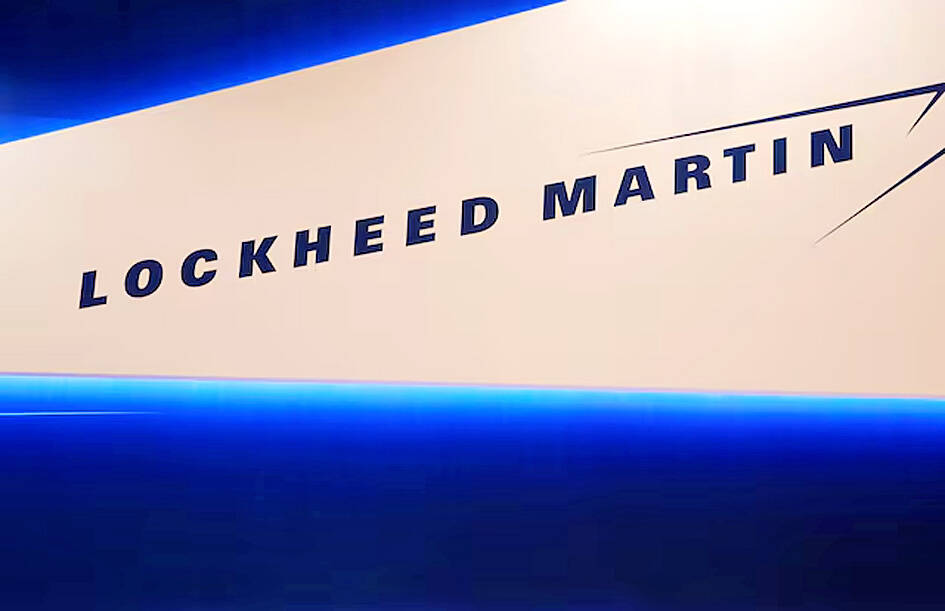China on Friday said it has banned a number of business units of US aviation manufacturer Lockheed Martin Corp and three of its executives over arms deals the company has signed with Taiwan.
A statement from the Chinese Ministry of Foreign Affairs said the company’s cooperation with Taiwan had violated its sovereignty, a standard terminology in its discussions of outside dealings that support the Taiwanese government.
The effects of the sanctions appeared largely symbolic since military cooperation between the US and China has been suspended since the Chinese People’s Liberation Army’s crackdown on student-led pro-democracy protests in Beijing and other cities in 1989.

Photo: Reuters
Those sanctioned were Lockheed Martin Missile System Integration Lab, Lockheed Martin Advanced Technology Laboratories and Lockheed Martin Ventures. Meanwhile, company executives James Donald Taiclet, Frank Andrew St. John and Jesus Malave were banned from traveling to China.
China has been steadily growing its domestic aircraft industry, producing parts, planes and services for Airbus and producing its own commercial jets. Foreign technology has played a big part in that process, but Chinese companies have increasingly developed the means to replace their overseas suppliers.
Taiwan relies heavily on US suppliers for arms, even as it works to boost its own defense industries and increase mandatory military service for men from four months to one year. That comes against the backdrop of China’s rising threat of encircling or invading Taiwan to achieve what it calls “a historical mission to annex the island.”

Taiwan has received more than US$70 million in royalties as of the end of last year from developing the F-16V jet as countries worldwide purchase or upgrade to this popular model, government and military officials said on Saturday. Taiwan funded the development of the F-16V jet and ended up the sole investor as other countries withdrew from the program. Now the F-16V is increasingly popular and countries must pay Taiwan a percentage in royalties when they purchase new F-16V aircraft or upgrade older F-16 models. The next five years are expected to be the peak for these royalties, with Taiwan potentially earning

STAY IN YOUR LANE: As the US and Israel attack Iran, the ministry has warned China not to overstep by including Taiwanese citizens in its evacuation orders The Ministry of Foreign Affairs (MOFA) yesterday rebuked a statement by China’s embassy in Israel that it would evacuate Taiwanese holders of Chinese travel documents from Israel amid the latter’s escalating conflict with Iran. Tensions have risen across the Middle East in the wake of US and Israeli airstrikes on Iran beginning Saturday. China subsequently issued an evacuation notice for its citizens. In a news release, the Chinese embassy in Israel said holders of “Taiwan compatriot permits (台胞證)” issued to Taiwanese nationals by Chinese authorities for travel to China — could register for evacuation to Egypt. In Taipei, the ministry yesterday said Taiwan

Taiwan is awaiting official notification from the US regarding the status of the Agreement on Reciprocal Trade (ART) after the US Supreme Court ruled US President Donald Trump's global tariffs unconstitutional. Speaking to reporters before a legislative hearing today, Premier Cho Jung-tai (卓榮泰) said that Taiwan's negotiation team remains focused on ensuring that the bilateral trade deal remains intact despite the legal challenge to Trump's tariff policy. "The US has pledged to notify its trade partners once the subsequent administrative and legal processes are finalized, and that certainly includes Taiwan," Cho said when asked about opposition parties’ doubts that the ART was

If China chose to invade Taiwan tomorrow, it would only have to sever three undersea fiber-optic cable clusters to cause a data blackout, Jason Hsu (許毓仁), a senior fellow at the Hudson Institute and former Chinese Nationalist Party (KMT) legislator, told a US security panel yesterday. In a Taiwan contingency, cable disruption would be one of the earliest preinvasion actions and the signal that escalation had begun, he said, adding that Taiwan’s current cable repair capabilities are insufficient. The US-China Economic and Security Review Commission (USCC) yesterday held a hearing on US-China Competition Under the Sea, with Hsu speaking on